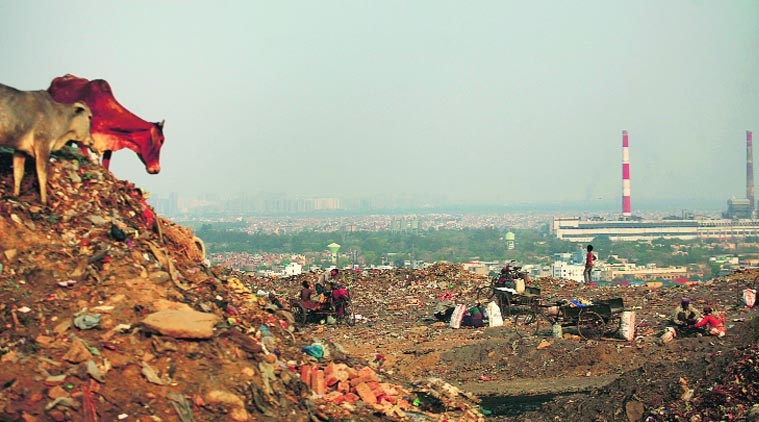- India
- International
Solid waste generation goes down by 42% in major cities
In Ahmedabad, solid waste generation has gone down by more than 50 per cent, while the bio-medical waste generated has doubled compared to the pre-lockdown period, says Harshadray Solanki, director of solid waste management in Ahmedabad Municipal Corporation (AMC).
 The biomedical waste that used to be 550-600 kilograms per day has now doubled to 1,000 kilograms and is further expected to go up to 3,000 kilograms, given the rampant use of masks and waste coming in from quarantined areas. (Representational Photo)
The biomedical waste that used to be 550-600 kilograms per day has now doubled to 1,000 kilograms and is further expected to go up to 3,000 kilograms, given the rampant use of masks and waste coming in from quarantined areas. (Representational Photo)
The quantity of solid waste generated in four major cities of Gujarat — Ahmedabad, Vadodara, Surat and Rajkot, has gone down by 42% per day as the country is going through the third week of lockdown to prevent the spread of COVID-19.
The waste being generated by the four cities combined is approximately 4,600 tonnes lesser than what was generated in the pre-lockdown phase per day. The solid waste management department attributed the plunge in trash generation to the closure of commercial establishments like food joints, malls and several office spaces for 21 days.
In Ahmedabad, solid waste generation has gone down by more than 50 per cent, while the bio-medical waste generated has doubled compared to the pre-lockdown period, says Harshadray Solanki, director of solid waste management in Ahmedabad Municipal Corporation (AMC).
“All local and urban bodies are actively undertaking door-to-door garbage collection. The government has allocated Rs 21 crore to provide masks, gloves and boots to around 51,000 of our sanitation workers in the urban centres. Waste generation has reduced as a lot of spaces are now closed due to the lockdown. The waste collected from quarantined houses is incinerated and does not make it to the overall trash,” said Lochan Sehra, Secretary, Urban Development, Government of Gujarat.
In Rajkot, where an average of 600 tonnes of waste was generated on a normal day, the quantity has now reduced by 100 tonnes. “We have urged people to segregate waste before dumping them. The dry waste generation has reduced due to closure of shops and offices and lack of any kind of activities on the streets,” said Nilesh Parmar, Environment Engineer, Rajkot Municipal Corporation (RMC).

After the imposition of the lockdown, many waste-pickers could not pick up garbage either because of restrictions by police or apartment societies, affecting garbage collection.
Rasik Solanki, who lives in Fatehgunj area of Vadodara, was working on contractual basis to collect garbage from every house in at least four societies in Bhayli area of the city, said: “Initially, I could manage to go every alternate day. Later the society asked me not to report to work as a precaution,” Solanki said. Every morning, a VMC garbage van goes to societies. The driver blows a whistle to alert the residents who then put the garbage bags in the van.
The Vadodara Municipal Corporation (VMC) figure reveals that on an average, the city generates approximately 1,000 tonnes of garbage on normal days. This has come down to 700 tonnes now.
“In Surat, people are asked to put trash in bins kept in their societies that are later taken away by garbage vans. Many societies have voluntarily decided to stop door-to-door collection,” said JN Naik, in charge of solid waste management department, Surat Municipal Corporation. In Surat, the waste generated has come down from 2,200 tonnes on an average daily to 1,500 tonnes.
On a normal day, for the AMC jurisdiction spread over a 464 square kilometre area, Solanki says the solid waste collection went up to 4,000 metric tonnes per day. This has now come down to 1,600-1,700 metric tonnes now.
“Construction has completely stopped so construction and demolition waste which used to be 1000 MT is now zero. Commercial unit waste collection that used to range from 650-700MT, too, has stopped,” said Solanki.
The biomedical waste that used to be 550-600 kilograms per day has now doubled to 1,000 kilograms and is further expected to go up to 3,000 kilograms, given the rampant use of masks and waste coming in from quarantined areas.
Apr 25: Latest News
- 01
- 02
- 03
- 04
- 05







































